
Canned Heat is an American blues and rock band that was formed in Los Angeles in 1965. The group has been noted for its efforts to promote interest in blues music and its original artists. It was launched by two blues enthusiasts Alan Wilson and Bob Hite, who took the name from Tommy Johnson's 1928 "Canned Heat Blues", a song about an alcoholic who had desperately turned to drinking Sterno, generically called "canned heat". After appearances at the Monterey and Woodstock festivals at the end of the 1960s, the band acquired worldwide fame with a lineup of Hite (vocals), Wilson, Henry Vestine and later Harvey Mandel, Larry Taylor (bass), and Adolfo de la Parra (drums).
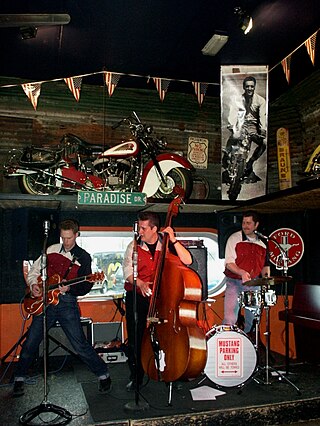
Rockabilly is one of the earliest styles of rock and roll music. It dates back to the early 1950s in the United States, especially the South. As a genre, it blends the sound of Western musical styles such as country with that of rhythm and blues, leading to what is considered "classic" rock and roll. Some have also described it as a blend of bluegrass with rock and roll. The term "rockabilly" itself is a portmanteau of "rock" and "hillbilly", the latter a reference to the country music that contributed strongly to the style. Other important influences on rockabilly include western swing, boogie-woogie, jump blues, and electric blues.

Heart is an American rock band formed in Seattle, Washington, in 1973. The band evolved from previous projects led by founding members Roger Fisher (guitar) and Steve Fossen, including The Army (1967–1969), Hocus Pocus (1969–1970), and White Heart (1970–1973). By 1975, original members Fisher, Fossen, and Ann Wilson, along with Nancy Wilson, Michael Derosier (drums), and Howard Leese formed the lineup for the band's initial mid- to late-1970s success period. These core members were included in the band's 2013 induction into the Rock and Roll Hall of Fame.

Paul Revere & the Raiders were an American rock band formed in Boise, Idaho, in 1958. They saw considerable U.S. mainstream success in the second half of the 1960s and early 1970s. The band was known for including Revolutionary War-style clothes in their attire.

ELO 2 is the second studio album by the Electric Light Orchestra (ELO), released in 1973. In the US, the album was released as Electric Light Orchestra II. It was the band's last album to be released by the Harvest label, the last on which the band used the definite article The in their name, and the one that introduced their abbreviated name 'ELO'.
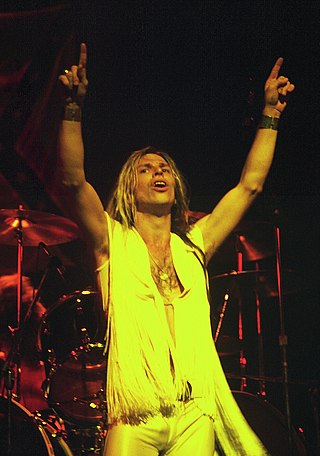
Black Oak Arkansas is an American Southern rock band named after the band's hometown of Black Oak, Arkansas. The band reached the height of its fame in the 1970s, charting ten albums. Their style is notable for multiple guitar players and the raspy voice and on-stage antics of vocalist Jim "Dandy" Mangrum.

The Exploding Hearts is an American punk rock and power pop band formed in Portland, Oregon, United States, in 2001. The band's principal lineup during their initial tenure was composed of lead vocalist and guitarist Adam Cox, bassist Matt Fitzgerald, guitarist Terry Six, and drummer Jeremy Gage.
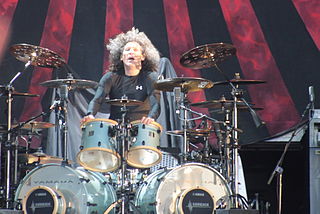
Tommy Aldridge is an American heavy metal and hard rock drummer. He is noted for his work with numerous bands and artists since the 1970s, such as Black Oak Arkansas, Pat Travers Band, Ozzy Osbourne, Gary Moore, Whitesnake, Ted Nugent, Thin Lizzy, Vinnie Moore and Yngwie Malmsteen.

On Your Feet or on Your Knees is the first live album by American rock band Blue Öyster Cult, released on Feb. 27, 1975 by Columbia Records. The album features three songs from each of the band's first three studio albums, two covers, and one original instrumental that remains a staple of the band's live shows to this day. The 12 songs include performances at the Academy of Music in New York City, the Paramount Theatre in Portland, the Paramount Theatre in Seattle, the Show Palace in Phoenix, the Long Beach Arena, the P.N.E. Coliseum in Vancouver and the Capitol Theatre in New Jersey, although it's not clear which songs came from which venues and on what dates.
Dash Rip Rock is an American rock band. The band is best known for its cowpunk sound, which mixes punk rock, rockabilly, hard rock, country and boogie. The New York Times stated that Dash Rip Rock combines “fluency in American roots music with a robust dose of punk-rock spirit.” Dash Rip Rock has toured consistently for decades.Bill Davis, Dash Rip Rock's founder and frontman, is a songwriter known for his blistering guitar work. Spin praised Dash Rip Rock as “undeniably the South’s greatest rock band.” In 2012, Dash Rip Rock was inducted into the Louisiana Music Hall of Fame.

Black Oak Arkansas is the eponymous debut studio album by American Southern rock band Black Oak Arkansas, released in 1971.

"So You Want to Be a Rock 'n' Roll Star" is a song by the American rock band the Byrds. Written by Jim McGuinn and Chris Hillman, it was included on the band's 1967 album, Younger Than Yesterday. The song was inspired by the manufactured nature of the Monkees and was released as a single on January 9, 1967, reaching number 29 on the Billboard Hot 100, but failing to chart in the United Kingdom.

Edgar Winter's White Trash is the second studio album by Edgar Winter, and his first with his group White Trash. The album reached #111 on the Billboard charts, and produced the single "Keep Playin' That Rock 'n' Roll", which went to #70 on Billboard's Top 100. The album was prepped for quadraphonic sound, but was left unreleased in this format. The album was produced by Rick Derringer. In Canada, the album reached #82. The track "Dying to Live" is sampled in 2Pac's posthumous release Runnin' .
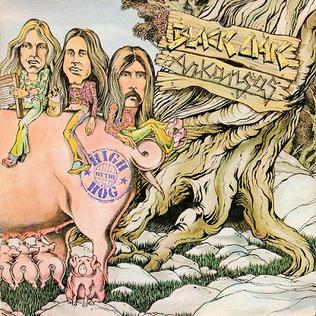
High on the Hog is the fourth studio album by American southern rock band Black Oak Arkansas, released in 1973 by Atco Records. It is known for its cover of the LaVern Baker song "Jim Dandy", which reached number 25 on the US Billboard Hot 100.

Live at the Paramount is a live video and album by American rock band Nirvana, released on September 24, 2011. It was released on DVD and Blu-ray Disc as part of the 20th anniversary of the band's second album and mainstream breakthrough, Nevermind.
Bill Davis is an American guitarist, vocalist, and songwriter. He is the founder, lead guitarist, and lead vocalist of the rock band Dash Rip Rock, and a member of the Louisiana Music Hall of Fame. Davis founded Dash Rip Rock in 1984 and is often credited as a pioneer of cowpunk, a genre that combines country and punk rock, but Davis has said in interviews that he considers his music to be widely roots-based. His work has been inspired by a variety of styles, including rock, country, power pop, punk, soul and, at times, Cajun.

Keep the Faith is the second album by Black Oak Arkansas released in 1972. The original LP pressings have "gimmick" top-loading cover with 2 fold-out flaps on front that reveals a different photo along with lyrics and credits when opened up.

If an Angel Came to See You, Would You Make Her Feel at Home? is the third studio album released by southern rock band Black Oak Arkansas in 1972. It is the recording debut of drummer Tommy Aldridge.

"I Do' Wanna Know" is a song written by Kevin Cronin that was the lead single from REO Speedwagon's 1984 album Wheels Are Turnin'. It was more of a rocker reminiscent of the songs REO Speedwagon had released in the 1970s than the ballads the band had been successful with in the early 1980s. It had limited success on popular music charts, which was blamed for delaying sales of the album until the release of the follow-up single, the ballad "Can't Fight This Feeling." The video to the song was nominated for several awards.
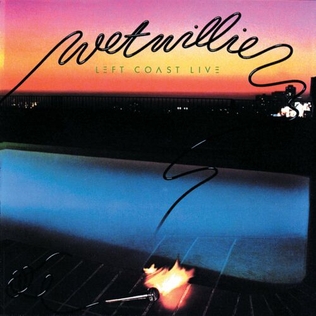
Left Coast Live is a live album by American rock band Wet Willie, released in June 1977. It was recorded on April 19, 1976, at the Roxy Theatre in West Hollywood. The album showcases the band's energetic performances of blues rock and southern rock songs.


















